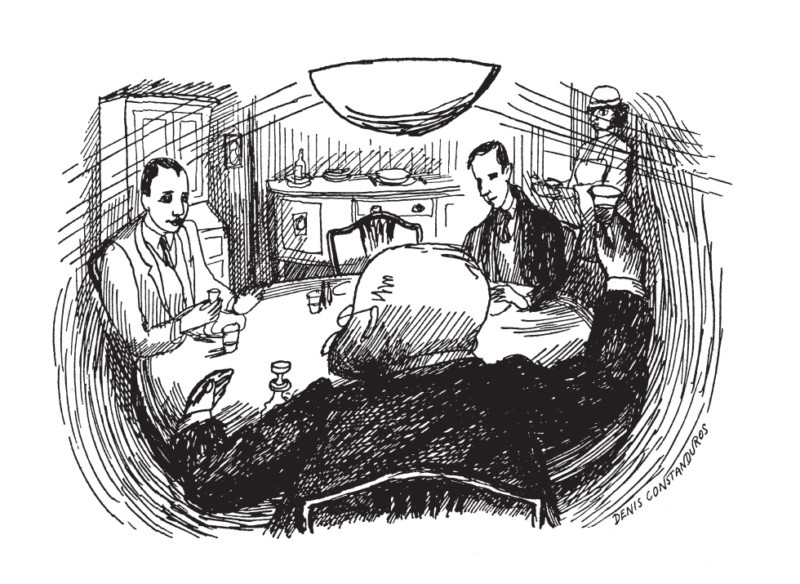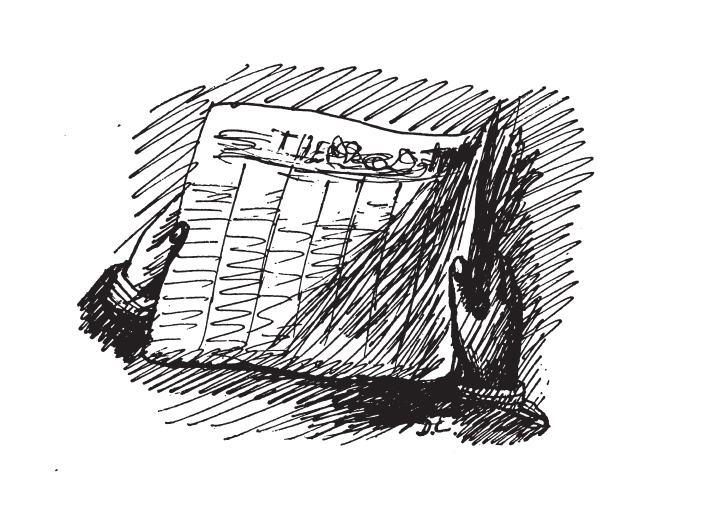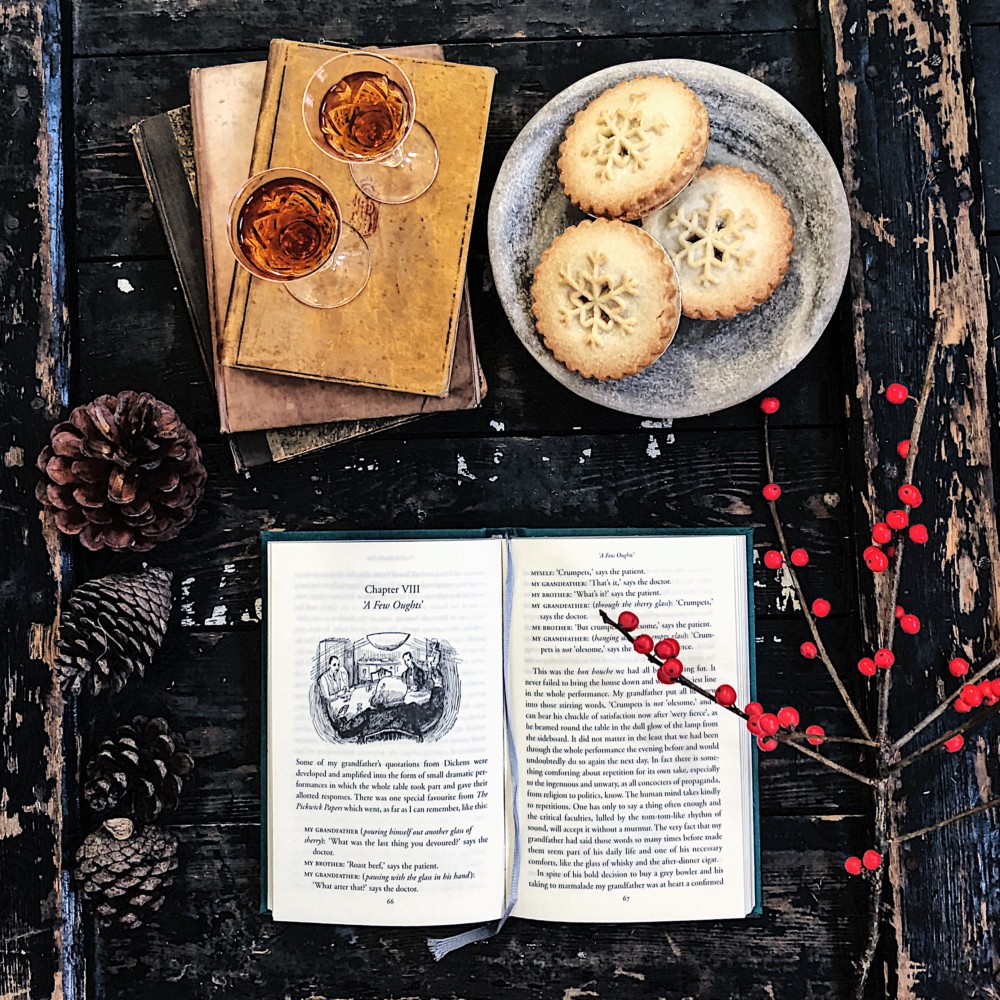Some of my grandfather’s quotations from Dickens were developed and amplified into the form of small dramatic performances in which the whole table took part and gave their allotted responses. There was one special favourite from The Pickwick Papers which went, as far as I can remember, like this:
my grandfather (pouring himself out another glass of sherry): ‘What was the last thing you devoured?’ says the doctor.
my brother: ‘Roast beef,’ says the patient.
my grandfather: (pausing with the glass in his hand): ‘What arter that?’ says the doctor.
myself: ‘Crumpets,’ says the patient.
my grandfather: ‘That’s it,’ says the doctor.
my brother: ‘What’s it?’ says the patient.
my grandfather: (through the sherry glass): ‘Crumpets,’ says the doctor.
my brother: ‘But crumpets is ’olesome,’ says the patient.
my grandfather: (hanging down his empty glass): ‘Crumpets is not ’olesome,’ says the doctor, wery fierce.

This was the bon bouche we had all been waiting for. It never failed to bring the house down and was the juiciest line in the whole performance. My grandfather put all he knew into those stirring words, ‘Crumpets is not ’olesome,’ and I can hear his chuckle of satisfaction now after ‘wery fierce’, as he beamed round the table in the dull glow of the lamp from the sideboard. It did not matter in the least that we had been through the whole performance the evening before and would undoubtedly do so again the next day. In fact there is something comforting about repetition for its own sake, especially to the ingenuous and unwary, as all concocters of propaganda, from religion to politics, know. The human mind takes kindly to repetitions. One has only to say a thing often enough and the critical faculties, lulled by the tom-tom-like rhythm of sound, will accept it without a murmur. The very fact that my grandfather had said those words so many times before made them seem part of his daily life and one of his necessary comforts, like the glass of whisky and the after-dinner cigar.
In spite of his bold decision to buy a grey bowler and his taking to marmalade my grandfather was at heart a confirmed ritualist
Subscribe or sign in to read the full article
The full version of this article is only available to subscribers to Slightly Foxed: The Real Reader’s Quarterly. To continue reading, please sign in or take out a subscription to the quarterly magazine for yourself or as a gift for a fellow booklover. Both gift givers and gift recipients receive access to the full online archive of articles along with many other benefits, such as preferential prices for all books and goods in our online shop and offers from a number of like-minded organizations. Find out more on our subscriptions page.
Subscribe now or Sign inSome of my grandfather’s quotations from Dickens were developed and amplified into the form of small dramatic performances in which the whole table took part and gave their allotted responses. There was one special favourite from The Pickwick Papers which went, as far as I can remember, like this:
 This was the bon bouche we had all been waiting for. It never failed to bring the house down and was the juiciest line in the whole performance. My grandfather put all he knew into those stirring words, ‘Crumpets is not ’olesome,’ and I can hear his chuckle of satisfaction now after ‘wery fierce’, as he beamed round the table in the dull glow of the lamp from the sideboard. It did not matter in the least that we had been through the whole performance the evening before and would undoubtedly do so again the next day. In fact there is something comforting about repetition for its own sake, especially to the ingenuous and unwary, as all concocters of propaganda, from religion to politics, know. The human mind takes kindly to repetitions. One has only to say a thing often enough and the critical faculties, lulled by the tom-tom-like rhythm of sound, will accept it without a murmur. The very fact that my grandfather had said those words so many times before made them seem part of his daily life and one of his necessary comforts, like the glass of whisky and the after-dinner cigar. In spite of his bold decision to buy a grey bowler and his taking to marmalade my grandfather was at heart a confirmed ritualist. He rose at the same hour every morning and trotted off to his cold bath, dressed in long pants which made him look more like Mr Pickwick than ever, and at exactly the same moment every day he would cross the road and mount his horse from the mounting block just inside Kensington Gardens. He was greatly helped in all this by Lucy. She was an arch ritualist. Whenever my grandfather went away for a holiday, which was as seldom as he could manage, she would arrange his room to be as nearly a replica of his study at home as she could make it: an armchair, with The Times folded over one arm, would be placed at the same angle to a smoking table as his chair at home. In fact everything would be done to make him forget that he had gone away at all. This was largely to shield him from shock, which, to Lucy, was inseparable from all forms of change and extremely dangerous to the system. Therefore change, in any form, was a thing to be avoided at all costs. (That was why, as I have said, she removed the purple bath mat from my grandfather’s bathroom. It was replaced with one the colour of quiet mud.) The satisfaction that my grandfather felt, then, when he declaimed the words: ‘“Crumpets is not ’olesome,” says the doctor, wery fierce,’ was a good, natural and primitive feeling. It was much the same as a native craftsman must feel after having repeated the same pattern for the five hundred and sixty-fourth time or a priest on uttering a familiar formula of words. It was the number of times he said it that pleased him. There is always something mesmeric in high numbers, as my grandfather knew himself, for, if he happened to glance through one of the less sober newspapers which occasionally found their way on to the breakfast table, and saw a lurid headline such as ‘50,000,000 Die in World’s Most Terrible Tornado’, or some other soothing story of other people’s troubles, he was not taken in for a moment. ‘Chah!’ he would say, putting down the paper in disgust, ‘What are a few oughts to a newspaper man?’ and he would revert to his Times, which would put the whole cataclysm in its place by merely mentioning it on an unimportant page, among meteorological reports, as ‘High Wind Velocity Recorded in Parts of Patagonia’. The mesmerism of high numbers is perfectly illustrated in Military Tattoos. Huge crowds will come from great distances in the middle of the night to see a thousand men doing at once what nobody would walk across the road to see one man do by himself. If one man wants to swing an Indian club that is his own business and nobody will be sufficiently interested even to try to stop him, but if a thousand men should swing Indian clubs together, then large sums can be charged for the pleasure of seeing them. A thousand times nought – or as my grandfather would have said ‘ought’ – is not ‘ought’, as any newspaper man knows, but about a million.
This was the bon bouche we had all been waiting for. It never failed to bring the house down and was the juiciest line in the whole performance. My grandfather put all he knew into those stirring words, ‘Crumpets is not ’olesome,’ and I can hear his chuckle of satisfaction now after ‘wery fierce’, as he beamed round the table in the dull glow of the lamp from the sideboard. It did not matter in the least that we had been through the whole performance the evening before and would undoubtedly do so again the next day. In fact there is something comforting about repetition for its own sake, especially to the ingenuous and unwary, as all concocters of propaganda, from religion to politics, know. The human mind takes kindly to repetitions. One has only to say a thing often enough and the critical faculties, lulled by the tom-tom-like rhythm of sound, will accept it without a murmur. The very fact that my grandfather had said those words so many times before made them seem part of his daily life and one of his necessary comforts, like the glass of whisky and the after-dinner cigar. In spite of his bold decision to buy a grey bowler and his taking to marmalade my grandfather was at heart a confirmed ritualist. He rose at the same hour every morning and trotted off to his cold bath, dressed in long pants which made him look more like Mr Pickwick than ever, and at exactly the same moment every day he would cross the road and mount his horse from the mounting block just inside Kensington Gardens. He was greatly helped in all this by Lucy. She was an arch ritualist. Whenever my grandfather went away for a holiday, which was as seldom as he could manage, she would arrange his room to be as nearly a replica of his study at home as she could make it: an armchair, with The Times folded over one arm, would be placed at the same angle to a smoking table as his chair at home. In fact everything would be done to make him forget that he had gone away at all. This was largely to shield him from shock, which, to Lucy, was inseparable from all forms of change and extremely dangerous to the system. Therefore change, in any form, was a thing to be avoided at all costs. (That was why, as I have said, she removed the purple bath mat from my grandfather’s bathroom. It was replaced with one the colour of quiet mud.) The satisfaction that my grandfather felt, then, when he declaimed the words: ‘“Crumpets is not ’olesome,” says the doctor, wery fierce,’ was a good, natural and primitive feeling. It was much the same as a native craftsman must feel after having repeated the same pattern for the five hundred and sixty-fourth time or a priest on uttering a familiar formula of words. It was the number of times he said it that pleased him. There is always something mesmeric in high numbers, as my grandfather knew himself, for, if he happened to glance through one of the less sober newspapers which occasionally found their way on to the breakfast table, and saw a lurid headline such as ‘50,000,000 Die in World’s Most Terrible Tornado’, or some other soothing story of other people’s troubles, he was not taken in for a moment. ‘Chah!’ he would say, putting down the paper in disgust, ‘What are a few oughts to a newspaper man?’ and he would revert to his Times, which would put the whole cataclysm in its place by merely mentioning it on an unimportant page, among meteorological reports, as ‘High Wind Velocity Recorded in Parts of Patagonia’. The mesmerism of high numbers is perfectly illustrated in Military Tattoos. Huge crowds will come from great distances in the middle of the night to see a thousand men doing at once what nobody would walk across the road to see one man do by himself. If one man wants to swing an Indian club that is his own business and nobody will be sufficiently interested even to try to stop him, but if a thousand men should swing Indian clubs together, then large sums can be charged for the pleasure of seeing them. A thousand times nought – or as my grandfather would have said ‘ought’ – is not ‘ought’, as any newspaper man knows, but about a million. 
Extract from My Grandfather and Father, Dear Father © Denis Constanduros 1948, 1989





